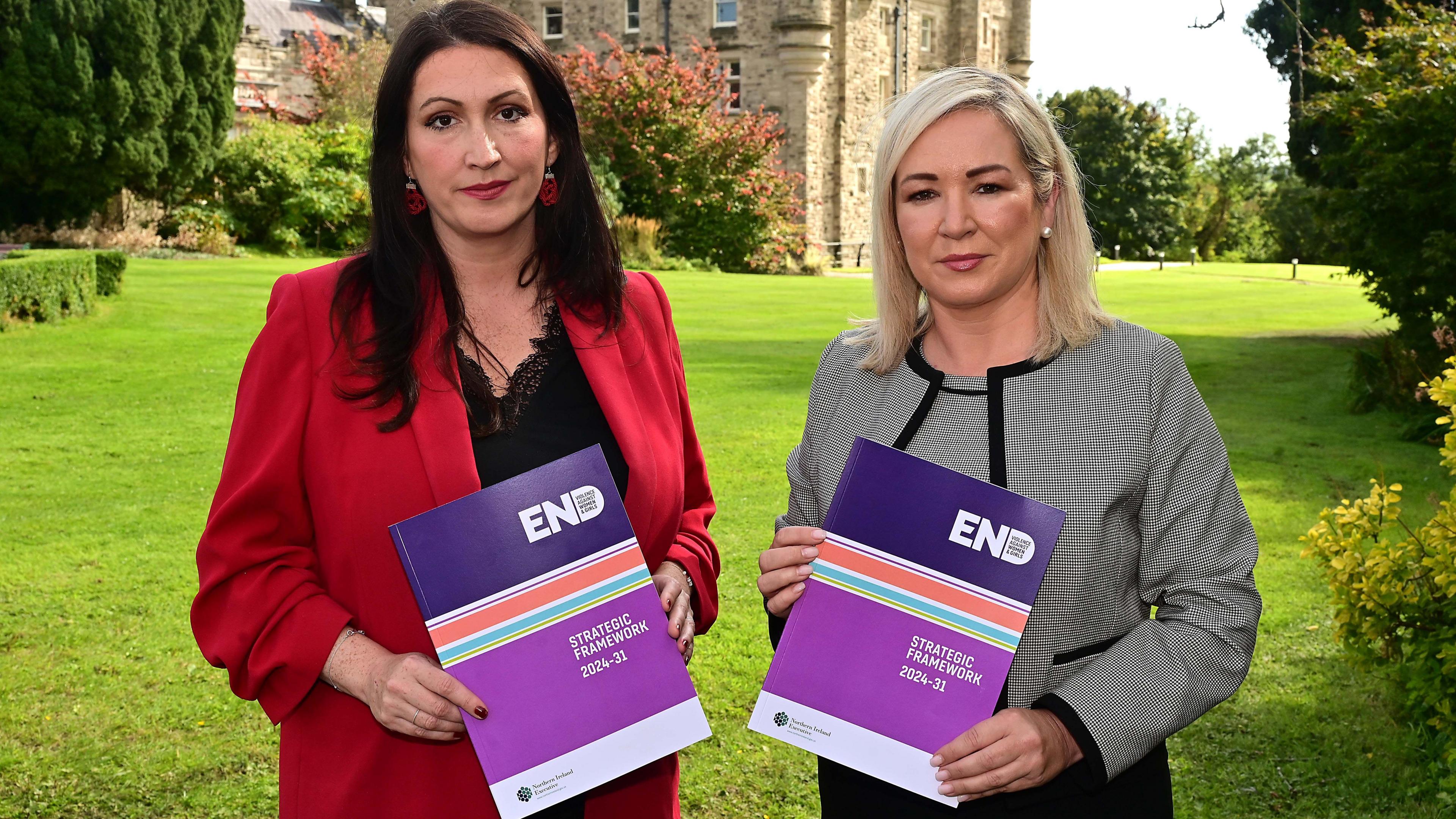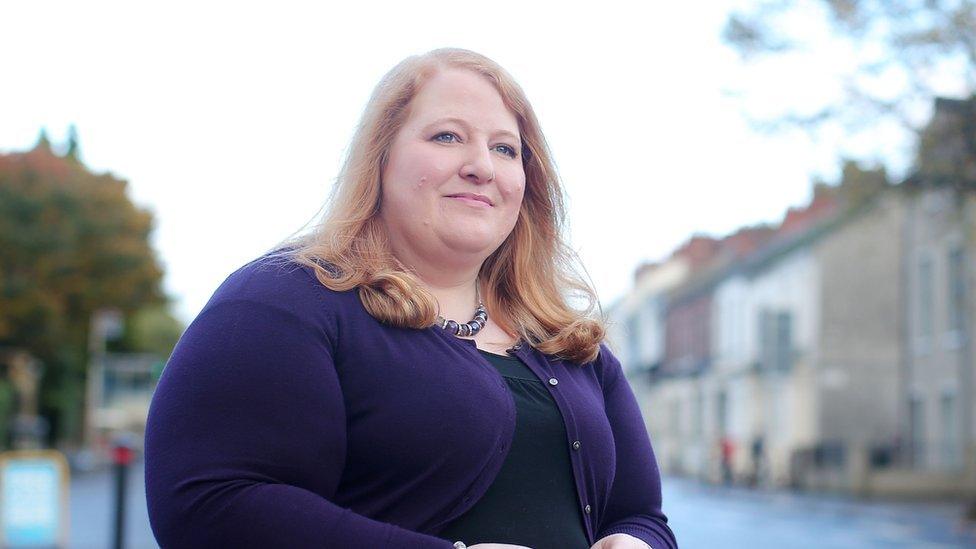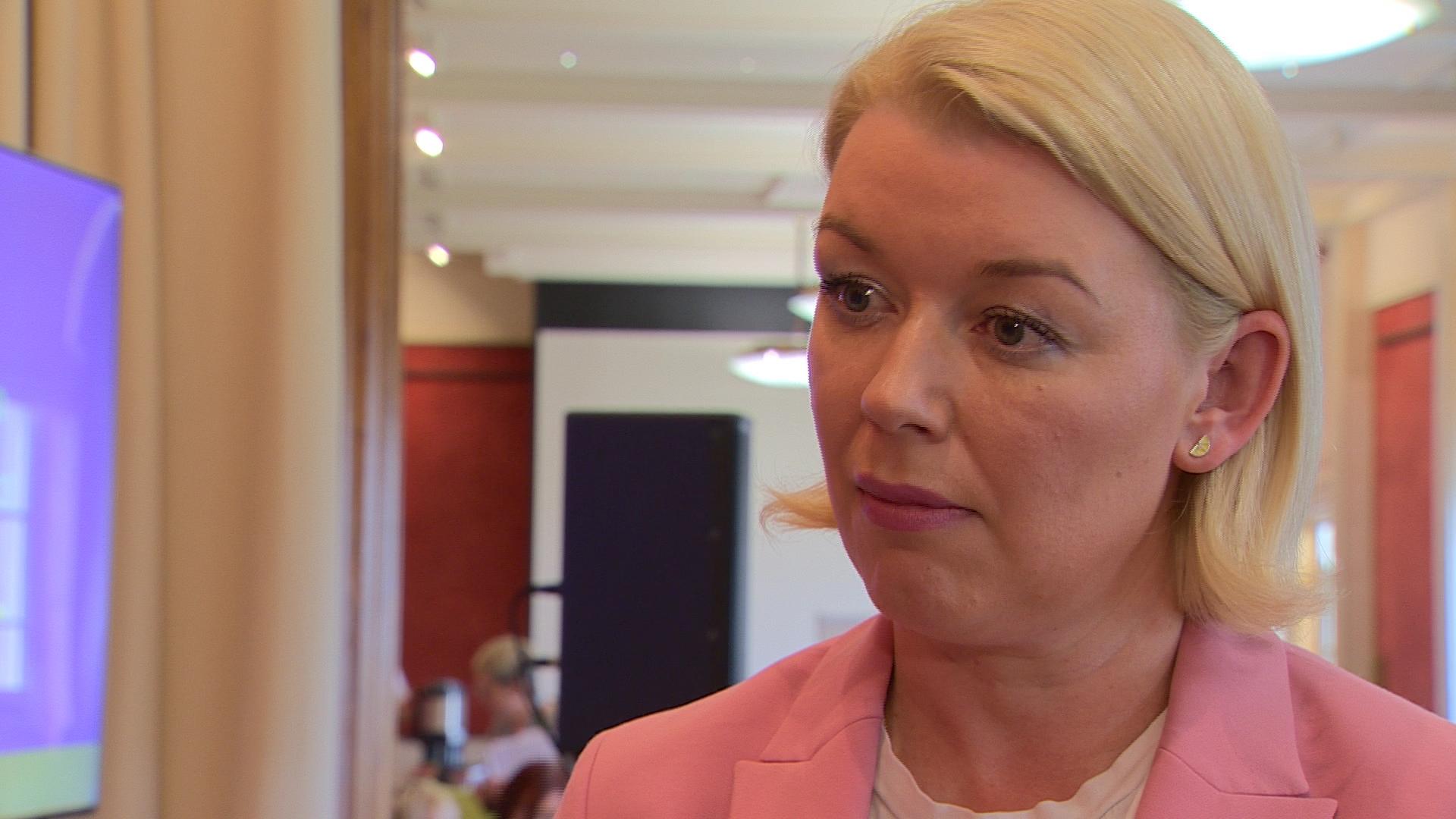'There should be outrage' over violence against women

Haileigh said she was "horrified by the reality of the criminal justice system"
- Published
A victim of sexual violence has told BBC News NI there should be outrage in our society over violence against women and girls.
Haileigh Ashton Lamont, who has waived her right to anonymity, was sexually abused by her stepfather as a child.
A new strategy to tackle violence against women and girls was launched at Stormont on Monday.
On Friday, the body of a woman was found in east Belfast and a 21-year-old man has been charged with murder.
There will be £3m of funding attached to the Ending Violence Against Women and Girls (EVAWG) strategy, external.
The executive will focus on four key areas over the next seven years:
Prevention
Protection and provision
Justice system
Working better together
First Minister Michelle O'Neill began by naming some of the 23 women murdered in Northern Ireland since January 2020, including the latest victim Rachel Simpson.
She said the strategy had been shaped by real people and there was a determination to act.
The strategy was first proposed in 2021.
Northern Ireland has long been the only part of the UK or Ireland without a strategy on the issue.
Haileigh was invited to be part of a consultation panel on the EVAWG strategy in 2021.
She has studied the action plan released last year and said she had concerns that not enough emphasis was going to be put on criminal justice solutions and reforms.
“I was shocked, horrified by the reality of the criminal justice system when I went through it,” she said.
“Offenders' attitudes aren’t going to change and they’re not going to be deterred from offending if there are no consequences.
"If they know if they do perpetrate and they’re arrested, the likelihood of them getting convicted is very low, or the experience is so traumatising for the victim that the victim could disengage.”
Haileigh said the statistics were shocking.
“I don’t think that individual politicians don’t want to see an end to this, they do. But there should be outrage. Anyone of us can be a victim, you don’t even need to leave your house, it happens in people’s homes most commonly," she added.

Deputy First Minister Emma Little-Pengelly and First Minister Michelle O'Neill were both at the launch
First Minister Michelle O'Neill said that “obviously we would want to have more money to invest in this area because it is such a deep rooted problem in society."
"We’ve said we’ll keep it under review and I’m sure Emma (deputy first minister) and I will not be found wanting in terms of trying to find addition resources where we can to invest in this work,” she added
Deputy First Minister Emma Little-Pengelly said, as well as funding, ending violence against women and girls would need "work within schools, FE and higher education colleges, within workplaces, within families."
"So of course the value of this is going to be much greater than simply the £3m allocated at the moment,” she added.
'Epidemic of violence'
The executive made EVAWG one of its key priorities in the Programme for Government which was published last week.
In that document the executive said: “We must work together to end the epidemic of violence, abuse, and harm against women and girls.
“Evidence shows that most women and girls here have experienced at least one form of gender-based violence."
Since January 2020, 23 women have been murdered in Northern Ireland.
There were more than 33,000 domestic abuse incidents in Northern Ireland in 2023.
In the last year there were more than 4,000 sexual violence and abuse reports made to police.
Tackling the root causes of gender-based violence and working on prevention will be key to the executive’s strategy, but the justice system will also have a huge role to play.

Northern Ireland Women’s Aid have been demanding a strategy since 2021
Work has been done in this area.
The Gillen Review, which was commissioned by the Department of Justice to improve criminal justice outcomes and the experiences of victims, made 253 recommendations in 2019.
Many of the recommendations have been carried out, with changes including limiting the number of people allowed in to courtrooms for serious sexual offences and increasing training for those working within the justice system.
Some of the ideas have proven successful, with the establishment of a remote evidence centre for vulnerable children and adult witnesses in Belfast being regular used.
However many of Justice Gillen’s recommendations are still outstanding.
He called for steps to be taken to combat excessive delays in the judicial system.
In March the BBC reported that sexual crimes take on average twice as long as other offences to reach the end of the criminal justice process.
'Start of change'
Last summer an EVAWG action plan introduced ideas around tackling gender-based violence, including relationship and sex education guidance and cross-sectoral workplace training and advice.
Northern Ireland Women’s Aid have been demanding a strategy since 2021.
Women’s Aid told BBC News NI: “This crucial step aligns us with neighbouring jurisdictions by implementing a cross-departmental approach to tackling violence against women and girls.
“Today is a start of change, and we all must continue to work together to help create a society where women and girls feel safe and are safe.”
The Police Service of Northern Ireland (PSNI) welcomed the launch.
Det Ch Supt Lindsay Fisher said 33 of the 41 actions in the PSNI's dedicated Tackling Violence against Women and Girls action plan, external had been completed within in the first two years.
"Violence against women and girls remains a plague on our society and a problem that we cannot simply arrest our way out of," she said.
"In the last month, three women in Northern Ireland lost their lives to VAWG, change is needed now," she added.
Related topics
- Published6 August 2022

- Published18 March 2021

- Published28 June 2022
